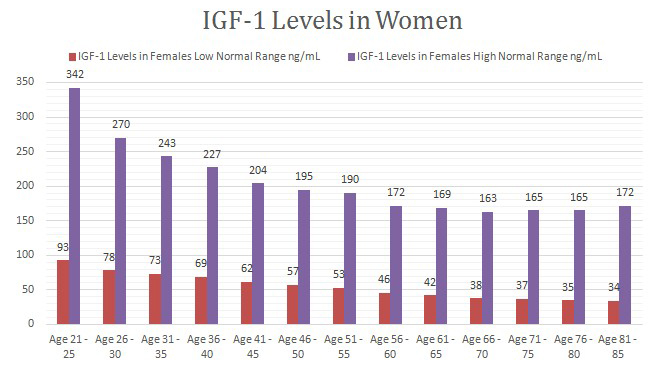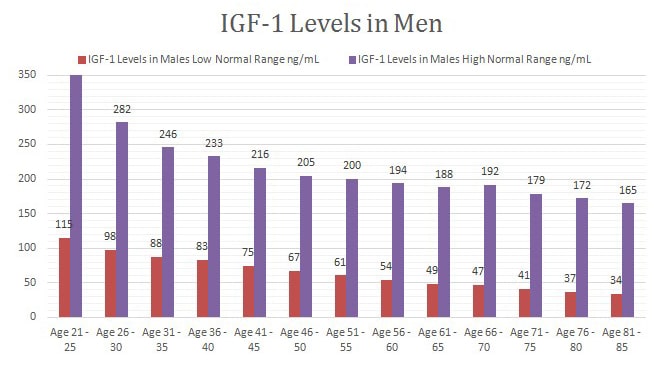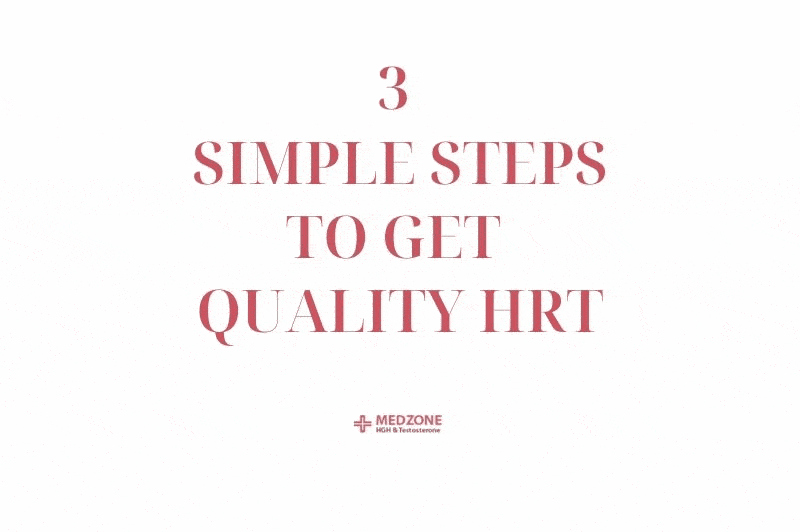Table of Contents
Long after the body stops growing, it still requires growth hormone (GH) to carry out a myriad of other essential daily functions. However, there is a clinical syndrome called growth hormone deficiency in adults that can hinder the ability of the body to perform to the best of its capabilities. In this comprehensive review, we look at the impact of GHD (growth hormone deficiency) on adults, how it occurs, testing, and guidelines for treatment.
Awareness is crucial for the detection of growth hormone deficiency in adults. Many doctors miss the clinical manifestations during regular yearly physical exams as they often view these changes as normal signs of aging, such as:
- Low libido
- Reduced energy
- Weight gain
- Mood changes
- Depression
- Muscle and bone loss
- Wrinkles
- Sagging skin
- Thinning or balding of hair
- Diminished eyesight
- Insomnia or reduced sleep
- Forgetfulness
Most people expect these changes to occur as they age. However, if you were to look around, you would likely realize that not everyone experiences all these “signs of aging” as they get older. Is it because they have “good genes,” or could it just mean that their bodies are still producing enough growth hormone to keep them going strong?
For some people, it is likely that their bodies still produce higher amounts of GH than their peers who suffer from these physiological changes.
Awareness of the signs of growth hormone deficiency in adults can lead you to early detection and treatment.
Meaning of Growth Hormone Deficiency
Growth hormone deficiency in adults occurs when the somatotrophs (cells in the anterior pituitary gland) do not release enough somatotropin (GH) into the bloodstream. The pituitary gland gets its signals from the hypothalamus, which sends growth hormone-releasing hormone (GHRH) to the somatotrophs to produce GH.
What is growth hormone deficiency going to do to adults?
As GH production declines, there is less somatotropin entering the bloodstream to bind with the body’s many growth hormone receptor cells. The cells that do not receive adequate GH remain idle, unable to carry out their actions. Depending on the location of the receptor cells, the lack of GH can impact cognitive, physical, emotional, and physiological functions.
To understand the growth hormone deficiency meaning better, think about how a car utilizes fluids such as gas and oil to keep it running. The same is true of the human body, which needs its fluids, also known as hormones or chemical messengers, to initiate vital actions. In the case of growth hormone, these activities include metabolism, brain functions, emotional stability, immune support, and perhaps the one most essential function – cellular regeneration.
Without the continual regeneration of new cells, the body’s muscles, internal organs, and bones will shrink and weaken. Skin layers will become thin and dry and collagen and elastin supplies decrease, making them more susceptible to damage. Hair strands will grow in thinner and fall out faster. Eventually, the body will start to show visual signs of aging.
Growth hormone deficiency in adults results in changes that affect mental, emotional, physical, and physiological well-being.
Normal Levels of Growth Hormone in Males and Females
Growth hormone levels reach their peak during puberty when spikes in somatotropin production fuel teenage growth. By the time young adults enter their twenties, secretion of GH by the pituitary gland begins to decline.
To measure growth hormone deficiency in adults, endocrinologists run a battery of blood tests to determine which hormones, if any, are out of balance. These blood panels also check critical components such as inflammation, thyroid function, red blood cell count, lipid levels, and more. The insulin growth factor 1 (IGF-1) test is the measurement used to check growth hormone levels. IGF-1 is the best marker for adult GHD, as its production is directly linked to GH levels. The liver secretes IGF-1 into the bloodstream in response to the amount of GH it receives.
In the two charts below, we look at female and male IGF-1 levels. The red area shows what a doctor would naturally consider being in the low range, indicating growth hormone deficiency. People who are borderline or close to low may also have low GH levels, depending on their symptoms.
In the pathophysiology of growth hormone deficiency, the doctor must distinguish between changes associated with natural aging as opposed to those due to clinically low growth hormone levels.
Doctors measure growth hormone deficiency in adults with comprehensive blood analysis, including the IGF-1 blood test.
Types of GHD
When we talk about growth hormone deficiency in adults, we look at one of the two primary types:
- Childhood-onset growth hormone deficiency
- Adult-onset growth hormone deficiency
In childhood-onset GHD, the pituitary gland did not produce enough growth hormone during a person’s youth to support natural growth. Children diagnosed with CGHD typically receive human growth hormone (HGH) therapy when they are young so that their growth can catch up to their peers.
For some adults who experienced GHD during childhood, the pituitary gland continues to underproduce GH during adulthood. They may require HGH therapy throughout their lives. Individuals who were not diagnosed as children may be shorter as adults and still experience problems related to low GH levels in later years.
With adult-onset, the pituitary gland produced enough growth hormone during childhood and adolescence but significantly decreased secretion in adulthood. In the next section, we will discuss the causes of adult-onset GHD.
Causes and Symptoms of Human Growth Hormone Deficiency in Adults
We have mentioned that the pituitary gland naturally decreases somatotropin production with age, as you can see in the two charts above. However, problems exist that can lead to a more rapid or severely increased decline in GH levels. These issues typically affect the performance of the pituitary gland or hypothalamus, resulting in declining hormone levels.
Causes of growth hormone deficiency in adults include:
- An injury to the brain resulting in damage or interference to the hypothalamus or pituitary gland
- A tumor in either the hypothalamus or pituitary gland that inhibits hormone production
- Interference with the blood supply to the brain, hypothalamus, or pituitary gland (Sheehan’s syndrome is an example due to severe blood loss following childbirth which results in decreased pituitary gland function)
- Radiation treatment or surgery for a brain tumor
- Genetic abnormalities such as Turner or Prader-Willi syndrome (typically diagnosed during childhood)
- Opioid, alcohol, or other drug abuse can lead to damage in the brain that can impact hormone production
- Lack of sleep (less than seven hours) regularly can result in a significant decline in growth hormone production as most GH release occurs nocturnally
- Poor diet, weight gain, lack of exercise, and a sedentary lifestyle can impede daytime GH secretion
- Continually high-stress levels send increased amounts of cortisol into the bloodstream which inhibits GH release
Growth hormone deficiency is not considered a hereditary condition. However, people who learn poor lifestyle habits at an early age may suffer from the same type of hormone decline as their parents before them.
The most common symptoms of GHD in adults include:
- Fatigue
- Weight gain
- Depression
- Low libido and other sexual changes
- Forgetfulness
- Joint pains
- Height shrinkage
- Muscle loss
- Balding or thinning of hair
- Sagging skin and wrinkles
- Decreased drive
- Social isolation
- Impaired concentration
- High cholesterol
- Reduced organ functions
- Sensitivity to hot and cold changes
- Increased stress and anxiety
- Sleep issues
Growth hormone deficiency in adults can stem from many causes and can lead to a variety of symptoms that can decrease a person’s quality of life.
Guidelines for Growth Hormone Deficiency Treatment
The guidelines for diagnosing growth hormone deficiency in adults call for measuring hormone levels in the blood to determine if GH levels are low. Without a proper and accurate diagnosis, a person cannot receive treatment for HGH deficiency.
An endocrinologist (a doctor who specializes in disorders of the endocrine system) is the best physician to contact for diagnosis and treatment. The balancing of hormone levels can be tricky, as when you increase one, it often impacts others. It is imperative to get the right dosage of hormone medication to instill homeostasis (balance) in the hormone levels and endocrine system.
Upon completion of testing, the doctor calculates how much growth hormone is necessary. A prescription is then provided for HGH therapy in the proper dosage.
Treatment guidelines for growth hormone deficiency in adults require the doctor to calculate how much HGH a person needs to restore hormonal balance. Our use of telemedicine enables us to diagnose growth hormone deficiency in adults with less of a drain on time or money.
Diagnosis in Our Clinic
When diagnosing growth hormone deficiency in adults in our clinic, our doctors follow the same medical guidelines as outlined below, with one variance that saves our clients both time and money – conducting all consultations by phone. Hormone replacement therapy falls under the category of medical treatments that can benefit from telemedicine, eliminating the need to take time away from work or one’s other responsibilities.
The diagnosis process for GHD is as follows:
- Consultation – by phone with one of our experienced hormone medical advisors
- Blood testing at a local lab
- Physical exam with any doctor
- Completion of our online medical history questionnaire
- Follow-up phone consultation to discuss results, diagnosis, and treatment
Ways to Increase HGH Level
Depending on the level of growth hormone deficiency in adults, we have two ways of increasing HGH levels:
- Naturally
- Medication
How is growth hormone deficiency treated naturally?
For a person who is just at the start of noticing symptoms, or with borderline IGF-1 levels, it is possible to make some lifestyle changes that can help increase natural growth hormone production:
- Get the right amount of sleep – between seven and nine hours provides the right amount of time for maximum GH release
- Try to go to bed by ten pm – eleven at the latest – to facilitate the circadian rhythm cycle for optimum hormone release
- Reduce stress to lower cortisol and increase GH production
- If you are overweight, then watching one’s diet and losing weight can help increase GH levels
- Engage in high-intensity interval training exercise three times a week to boost GH secretion
- Intermittent fasting has been shown to increase growth hormone secretion
The doctor will determine the best option for treating growth hormone deficiency in adults following a careful review of blood test and physical exam findings. Diagnosis of GHD can help reduce the risks associated with many other health conditions.
How do you treat growth hormone with medicine, and does it cure GHD?
Doctors use either HGH, sermorelin, or ipamorelin injections to boost growth hormone levels. These are not cures; however, in all situations, the prognosis is excellent. Here are explanations about these medicines:
- Human growth hormone injections: HGH therapy is the primary treatment for growth hormone deficiency. It provides the body with an immediate supply of bioidentical hormones ready to bind with the GH receptors. Treatment with HGH injections is best for people with very low GH levels or those with symptoms that are interfering with their daily life.
- Sermorelin and ipamorelin are both secretagogues, medications that work on either the hypothalamus or pituitary gland to increase natural growth hormone production. It takes longer for these medications to work, making them a better choice for people who do not yet have annoying symptoms of GHD.
Facts and Answers
Is growth hormone deficiency a disability?
Although growth hormone deficiency in adults is not a disability, it can lead to symptoms and other health conditions that can impact and impede daily life. For some people, the loss of bone density can cause osteoporosis. Severe depression can lead to an inability to perform everyday tasks. Dementia, cardiovascular disease, and type 2 diabetes risks all increase with untreated GHD.
Is there a connection between hypothyroidism and growth hormone?
Hypothyroidism can contribute to changes in growth hormone production. HGH therapy can also alter thyroid hormone functions, which is why monitoring of the patient while using human growth hormone treatment is necessary.
How rare or common is the growth hormone deficiency prevalence in adults?
Current statistics show that three out of every 10,000 adults may have a growth hormone deficiency. Many more may be borderline or starting to experience these changes. With the aging of the Baby Boomer population, these numbers may likely climb.
HGH replacement therapy is contraindicated in only a few instances but provides many benefits at reducing other, more severe health issues.
GHD Personal Stories of Our Clients
Growth hormone deficiency in adults can impact people in many different ways. That is why we always tell people not to judge their condition by the symptoms of anyone else. In the stories below, you will see how three different individuals experienced the same medical condition in unique ways:
I had always been afraid of growing and looking older, so when I started to notice my hair getting thinner, wrinkles, age spots, and less defined muscles, I panicked. A friend recommended that I call your clinic, and I did. I had no idea that growth hormone decline could cause these problems. It’s been six months since I started HGH therapy, and I am happy to report that I look and feel years younger. Even my brain fog and forgetfulness have vanished.
After suffering for two years with no sex drive, anxiety, mood swings, and a total disinterest in any type of socializing, my wife started threatening me with divorce. I had no idea why I felt this way, only that I needed help, so I talked to a friend of mine, and he told me how HGH therapy had helped him. I had no idea he had also suffered from issues, although his were a little different than mine. I called your clinic, went through the tests, and discovered that I had growth hormone deficiency. It’s been four months since I started HGH therapy, and all my issues have disappeared, and my wife and I couldn’t be happier.
When I first contacted your clinic, I was suffering from severe depression, insomnia (sleeping only 4 hours a night), weight gain, and fatigue. It felt as if I could not get through the day without falling apart. After getting tested and being diagnosed with growth hormone deficiency, I started my HGH therapy three months ago. Within one month, I was averaging six hours of sleep a night and had less fatigue during the day. I am now getting about eight hours of sleep each night, I have lost 10 pounds, am actually exercising again, and rarely suffer from fatigue or depression.




No Comments
Sorry, the comment form is closed at this time.